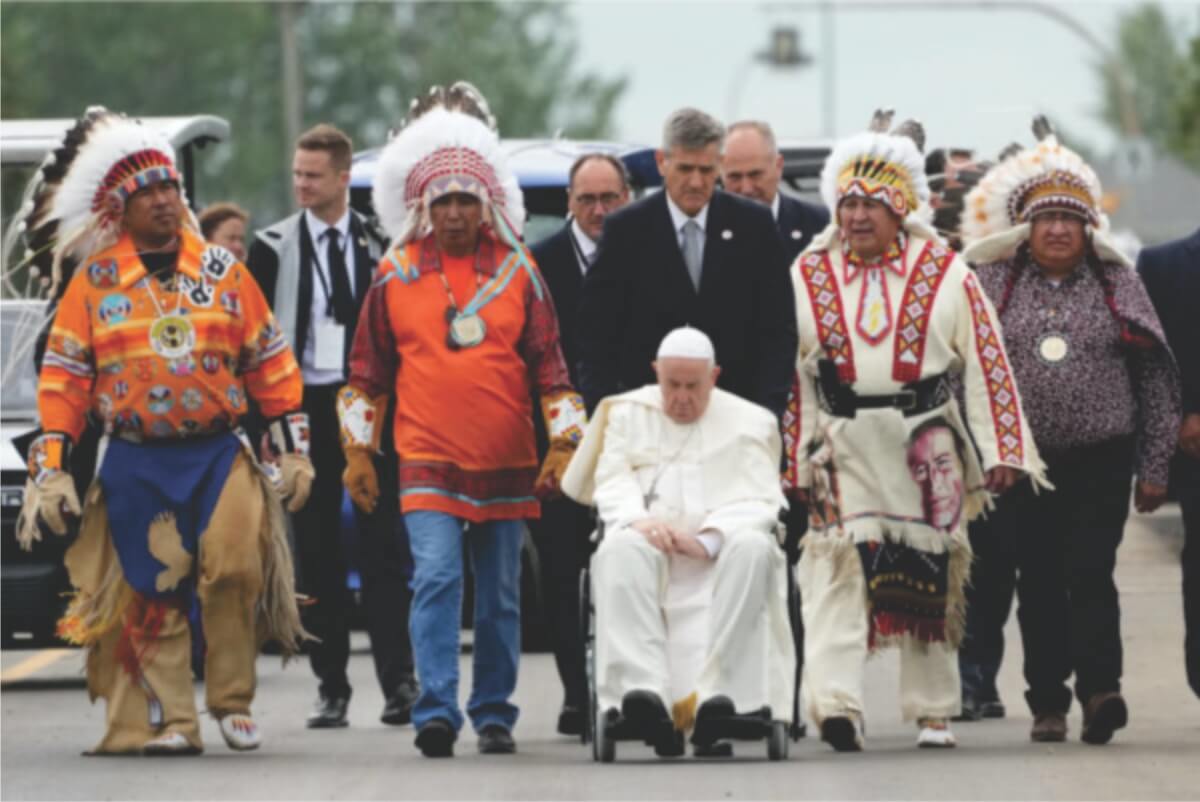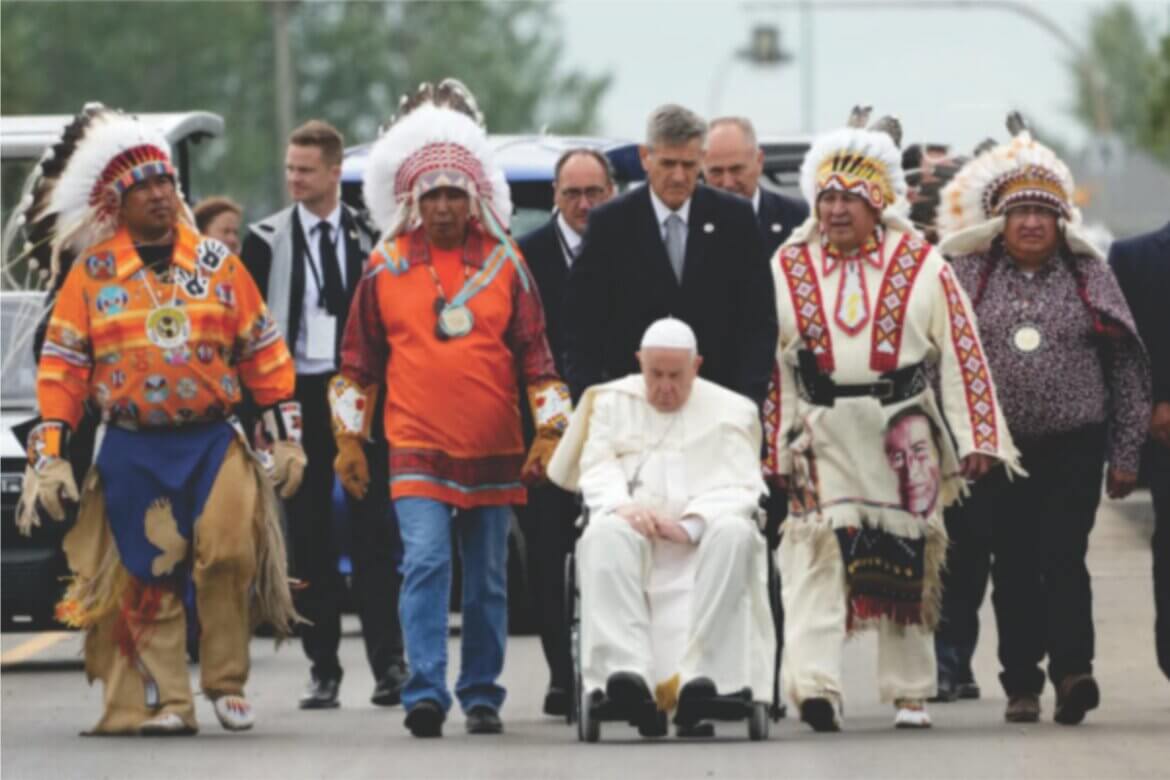Post Vatican II Perspective: Penitential Pilgrimage of Pope Francis
Douglas Roche, Edmonton, AB
Volume 37 Issue 7, 8 & 9 | Posted: October 9, 2022

The extraordinary “penitential pilgrimage” of Pope Francis to Canada opens up an array of questions about who we are as Vatican II Catholics. There is undoubted wisdom in the Indigenous belief that serious questions require seven generations to resolve. But in the technologically-driven 21st century, I don’t think we have that much time to work out the full meaning and follow-up to Pope Francis’s visit. The healing of those afflicted by the Church’s harmful practices in residential schools, and their descendants, needs to be dealt with now, not put off to some distant future.
The heart of Francis’s message was, of course, the apology given at Maskwacis, the First Nations centre south of Edmonton. Examine his words: “I am here because the first step of my penitential pilgrimage among you is that of again asking forgiveness, of telling you once more that I am deeply sorry. Sorry for the ways in which, regrettably, many Christians supported the colonizing mentality of the powers that oppressed the Indigenous peoples. I am sorry. I ask forgiveness, in particular for the ways in which many members of the Church and of religious communities cooperated, not least through their indifference, in projects of cultural destruction and forced assimilation promoted by the governments of that time, which culminated in the system of residential schools..”
And again: “In the face of this deplorable evil, the Church kneels before God and implores his forgiveness for the sins of her children…with shame and unambiguously. I humbly beg forgiveness for the evil committed by so many Christians against the Indigenous peoples.”
2.
We can thank the Second Vatican Council for the strength of this unprecedented apology. Can you imagine Pius XII, to name but one of a long line of imperious pontiffs, abjecting himself in such a way? Previously, the Church presented itself as a perfect instrument frozen in time. But the Council defined the Church as a struggling community trying to express itself in each new age in Jesus’s words of love and mercy.
The days of the pope being carried on a sedia gestatoria through St. Peter’s Basilica are over. The transformation of the Church from an enclosed hierarchy to the people of God opened the door for apologies for the wrongs committed in the name of the Church. Thus, as Pope Francis said at Notre Dame Cathedral in Quebec: “The Church in Canada has set out on a new path, after being hurt and devastated by the evil perpetrated by some of its sons and daughters.”
To focus only on the quality of the apology is to miss the shift in attitude of the whole Church, which now has a more enlightened view of the wholeness of humanity. Never again, as Francis said, can the Christian community allow itself to be infected by the idea that one culture is superior to others, or that it is legitimate to employ ways of coercing others.
In focusing so intensely on the apology, the media missed the full scope of Francis’s message to Canada: healing in today’s world must extend from the residential schools issue to humanity as a whole. It is the world that is hurting from the abuse of power, not just the Indigenous students. This led the Pope, in Quebec City, to scorn “the senseless folly of war,” and reject all forms of hostility and extremism.
3.
The arms race and strategies of deterrence will not bring peace and security, he said. Obliquely referring to the Ukraine war, Francis said: “We need to ask ourselves not how to pursue wars, but how to stop them…What we need are creative and far-sighted policies capable of moving beyond the categories of opposition in order to provide answers to global challenges.”
Then he named the great challenges of our day: peace, climate change, the pandemic and international migration movements. “All of them speak of the need to consider the whole; politics cannot remain imprisoned in partisan interests.” It is “scandalous” that the well-being generated by economic development does not benefit all the sectors of society. This is a message straight out of one of Vatican II’s principal documents, The Church in the Modern World.
As he expressed his sorrow for the residential schools debacle, Francis also showed that the processes of reconciliation and healing must extend around the world. Overcoming personal health challenges to even make such an arduous journey, this Pope — of the 21st century — opened his arms and heart to all to tell us that if we are serious about repairing the damage done by the residential schools, we must have a reconciliation of all peoples. This means re-building our spiritual life “in new forms and new ways of existing.”
This open-ended approach takes to a new level the thorny question of who is responsible to repair the cycles of damage which originated in centuries past when obsessive colonialism drove both state and church policies. We have arrived in a world where we are all inter-linked and where the human rights of one are the human rights of all. That is an essential lesson from the Second Vatican Council. By reaching out his hand and sincerely apologizing to the Indigenous people, Pope Francis drove the lesson home.
4.
Reconciliation with the Indigenous people is of utmost importance, for they are in our midst, as Francis poignantly recalled: “It is indeed sad that precisely among the native peoples we often find many indices of poverty, along with other negative indicators, such as the low percentage of schooling, and less than easy access to owning a home and to health care.”
Then he spoke to all the Canadian people: “May the emblem of the maple leaf, which regularly appears on the labels of the country’s products, serve as an incentive to everyone to make economic and social decisions that foster participation and care for those in need.”
Reconciliation, which ultimately must extend around the world, starts at the “local level,” as the Pope observed at Sacred Heart Church in Edmonton. So what will the follow-up to the Pope’s visit look like in Canada? Where does the “new path” in Canada take us? What will the Church do to help Indigenous people reclaim their language, culture and spirituality? The answers to these questions are not clear. To whom should we look for answers?
In a Vatican II Church, we cannot look just to the bishops, though surely the bishops must lead. The people of God are involved here. How will we answer Pope Francis’s call?
Douglas Roche is a former Canadian senator and author. He was the founding editor of the Western Catholic Reporter in the 1960s just after Vatican II.
Douglas Roche, Edmonton, AB

